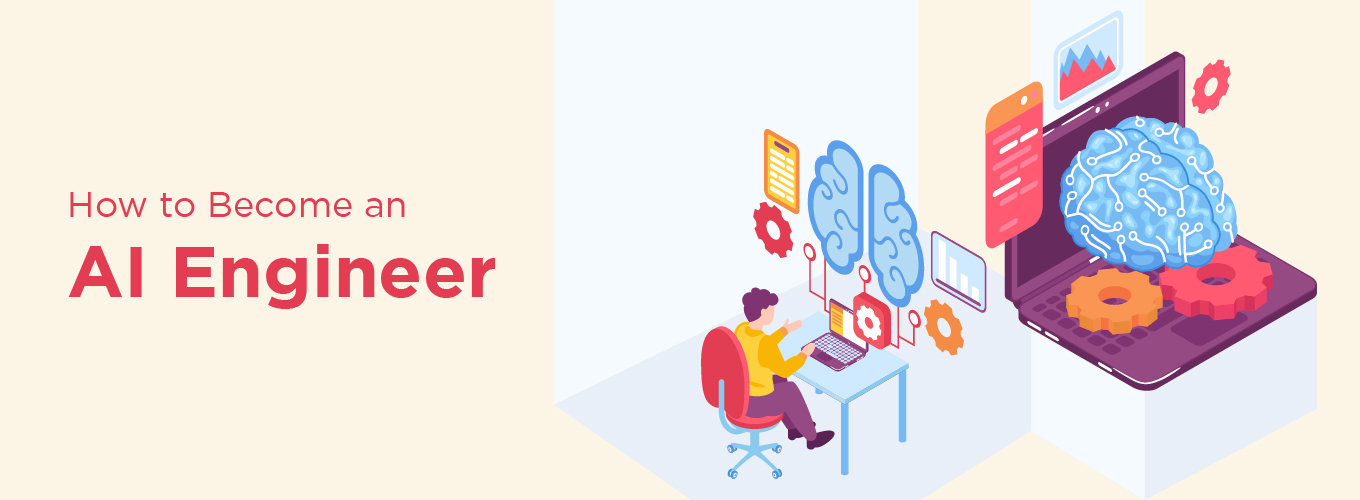How to become an AI Engineer?
The branch of computer science that involves teaching machines to think like humans by recognizing patterns is called artificial intelligence (AI). Several companies use AI to analyze and compile information to make business decisions and to help in various aspects of business. Since AI can seamlessly help handle vast amounts of data and simplify them into common tasks, companies can use AI effectively while their teams can focus on other work.
Artificial intelligence is used by companies across industries, and consequently, the prospects for an AI engineer are huge. Jobs in the AI space are booming and growing significantly.
What does an AI engineer do?
AI engineers are required to create, test, and implement AI models and the AI infrastructure. They are also required to handle software and machine learning models.
The AI engineers coordinate with the business leaders and the software engineers to see how AI can be used to effectively improve the business processes. They can help use machine learning techniques to recognize images and voice transcripts to analyze data.
AI engineers design solutions for repetitive tasks that mimic human behaviour and can therefore interact with customers, as is done by chatbots and in recommendations on apps and shopping sites.
Skills required to become an AI engineer
Non-technical skills
- You are required to have good communication and collaboration skills since you will be interacting with a wide range of people. You will be required to explain how you will work and deliver the results that companies require.
- Your job will require you to coordinate with several business leaders; hence you must have good business acumen. You should be aware of the market, customers and how the business runs. Plain technical knowledge will be useless without this acumen.
- You will definitely be required to have good analytical skills.
- To be meticulous and detail-oriented. This is because small mistakes can result in big discrepancies in machine learning models.
- Be required to think big so that you can visualize the business needs, the impact that you can make and deliver the required results.
- You must have idea iteration skills. This is also called rapid prototyping. To find a viable idea, you must work with and consider several ideas as quickly as possible. You must use various techniques to quickly create realistic scale models of solid parts or assemblies using 3D computer-aided designs.
Also Read: Advantages Of Artificial Intelligence
Technical skills
- Educational qualifications such as a bachelor’s degree in computer science, data science or statistics are definitely needed.
- A master’s degree in math or cognitive science or any of the fields listed above will be additionally very useful.
- Good knowledge of the principal branches of mathematics like statistics, linear algebra, probability, and calculus.
- Programming languages such as Python, R, Java and C++, Lisp and Prolog.
- Algorithms and applied mathematics.
- Familiarity with big data technologies and knowledge of Hadoop, Apache Spark, Cassandra and MongoDB is a must.
- Machine learning algorithms such as linear regression, Naïve Bayes, Gaussian mixture models and linear discriminant analysis. You will also be required to be familiar with deep learning algorithms such as neural networks, generative adversarial networks and implement them with a framework.
- Natural language processing is an added advantage and knowing NTLK, sentiment analytics, TextBlob, Core NLP and PyNLP will be helpful.
Apply for jobs
Apart from learning these skills, it is also important that you get some experience. Don’t get intimidated that you have no experience to get the job of an AI engineer. In fact, it may be helpful to know that people get hired very often for an AI engineer’s role without any experience.
While learning technical skills is important, please remember to work on custom AI projects on your own. Adding your course projects and your own projects to your portfolio helps build it strongly.
Updating your LinkedIn profile actively with your learning achievements and projects will help attract recruiters of companies looking for AI engineers.
Update your interviewing skills as there may be several rounds of interviews for even an entry level job or internship.
Conclusion
For skilled professionals, AI is a booming field with lucrative job opportunities. AI is a great field where you can apply the skills that you have learnt to not only deliver business insights but to also change the lives of people. You never stop learning and there are phenomenal opportunities for growth. The field also offers good pay packages.










